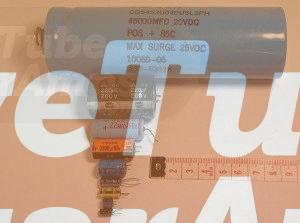Electrolytic Capacitors
You find electrolytic capacitors in the power supply and decoupling of valves in Hifi and guitar amps. They are like a battery because they have a positive and negative terminal. In you amp power supply they can have values of 22 up to 200 or more uF ( uF= micro-farads). Electrolytic capacitors store energy, and often they are working at voltages of 500 volts DC ! When you switch off your amp , they can hold a high voltage for hours and so you can get a bad electric shock from equipment that is switched off and dis-connected from the mains. Be warned !!
One thing that electrolytic capacitors hate and that is not being used for weeks and months. When they go for a long period without power they chemically deteriorate. So, when you switch on after months you can hear a loud mins hm from the speakers or even a loud bang as a big power supply electrolytic goes off like grenade !! I have seen this happen and the innards of the capacitor embed itself on the wall opposite my work bench. Scary! So regularly power up the equipment if you want to keep your capacitors in good condition.
You can recover old electrolytic capacitors by reforming them . This involves removing them from the amp and connecting them to a power supply and slowly over a period of hours raising the voltage from zero up to say 80% of the maximum rated voltage. My view if they need this then they are the Walking wounded” and better to replace them. The high temperatures inside the case of an amp also limits their life. The best ones are rated 2000 hours at 71C . Life is much longer at below 50C. But your amp does get hot inside ! My rule is to replace the power supply capacitors after 5 years in a hard-working amp. A Home use only amp every 10 years. ( just a personal opinion based on experience ).
Picture used with permission of Dave Porter and Peter Chadwick originally published in the Vintage and Military Radio Society magazine, “Signal”

